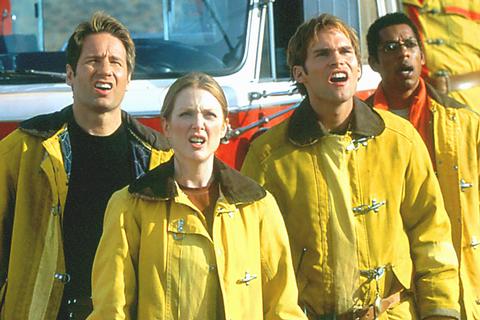Rated PG-13, directed by Ivan Reitman, with: David Duchovny (Ira), Julianne Moore (Allison), Orlando Jones (Harry), Seann William Scott (Wayne) and Ted Levine (Dr. Woodman), running time: 103 minutes.
Haven't we been here before? A meteor crashes to earth with lifeforms that could potentially eliminate humankind and a pair of scientists -- among them David Duchovny of X-Files fame -- who harbor deep suspicions about the government's intentions take it upon themselves to handle the situation. Sounds familiar, but Evolution is actually a comedy and the sense of deja vu is quickly dispelled by the hilarious role played by Orlando Jones. The amoebas on the meteor are evolving at breath-taking speed, which prompts the authorities to take over the research and containment of the threat, but through their bungling, Jones and Duchovny and a truckload of Head and Shoulders shampoo are forced to save the day. Along the way are some predictable references to the X-Files and one scene in which an alien must be extracted from Jones' body through the back door, so to speak. The humor is base and Julianne Moore's fumbling rather silly, but the lines are well-delivered and the story delightfully quirky.

PHOTO COURTESY OF BUENA VISTA

The unexpected collapse of the recall campaigns is being viewed through many lenses, most of them skewed and self-absorbed. The international media unsurprisingly focuses on what they perceive as the message that Taiwanese voters were sending in the failure of the mass recall, especially to China, the US and to friendly Western nations. This made some sense prior to early last month. One of the main arguments used by recall campaigners for recalling Chinese Nationalist Party (KMT) lawmakers was that they were too pro-China, and by extension not to be trusted with defending the nation. Also by extension, that argument could be

Aug. 4 to Aug. 10 When Coca-Cola finally pushed its way into Taiwan’s market in 1968, it allegedly vowed to wipe out its major domestic rival Hey Song within five years. But Hey Song, which began as a manual operation in a family cow shed in 1925, had proven its resilience, surviving numerous setbacks — including the loss of autonomy and nearly all its assets due to the Japanese colonial government’s wartime economic policy. By the 1960s, Hey Song had risen to the top of Taiwan’s beverage industry. This success was driven not only by president Chang Wen-chi’s

Last week, on the heels of the recall election that turned out so badly for Taiwan, came the news that US President Donald Trump had blocked the transit of President William Lai (賴清德) through the US on his way to Latin America. A few days later the international media reported that in June a scheduled visit by Minister of National Defense Wellington Koo (顧立雄) for high level meetings was canceled by the US after China’s President Xi Jinping (習近平) asked Trump to curb US engagement with Taiwan during a June phone call. The cancellation of Lai’s transit was a gaudy

The centuries-old fiery Chinese spirit baijiu (白酒), long associated with business dinners, is being reshaped to appeal to younger generations as its makers adapt to changing times. Mostly distilled from sorghum, the clear but pungent liquor contains as much as 60 percent alcohol. It’s the usual choice for toasts of gan bei (乾杯), the Chinese expression for bottoms up, and raucous drinking games. “If you like to drink spirits and you’ve never had baijiu, it’s kind of like eating noodles but you’ve never had spaghetti,” said Jim Boyce, a Canadian writer and wine expert who founded World Baijiu Day a decade